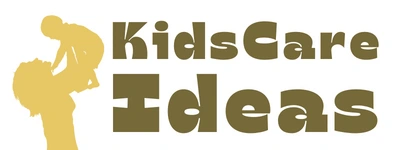If you would like to know about the Monopoly Man, including his real name, wealth, and other facts, you can find all of that information in this post.
Before making an appearance in Monopoly, Rich Uncle Pennybags was a playable character in several other cards and board games published by Parker Brothers.
These games included Chance and Community Chest. J. P. Morgan, an influential American businessman from the Progressive Era, served as an inspiration for the character of Rich Uncle Pennybags.
The Rich Uncle Pennybags has been redesigned as the mascot for the Monopoly board game, where the character originates.
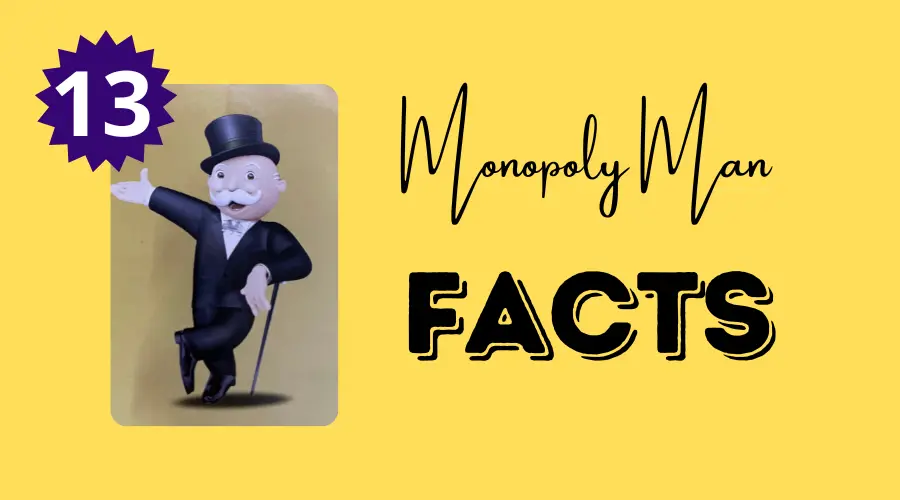
The surface is based on the Monopoly board game. In the beginning, everyone called him Rich Uncle.
Let’s get started!
What is the name of the Monopoly Man?
The long-time mascot of Parker Brothers’ (later Hasbro’s) iconic Monopoly game is a character named Mr. Monopoly or Monopoly Man, whose real name is Rich Uncle Milburn Pennybags.
Despite our lack of specific identification, we can all name the “Monopoly Man” or “the monopoly person.”
The Rich Uncle Pennybags inspiration for this character comes straight from the Monopoly board game, where he serves as the game’s mascot.
His original moniker was “Rich Uncle.” No one knows who created the character initially.
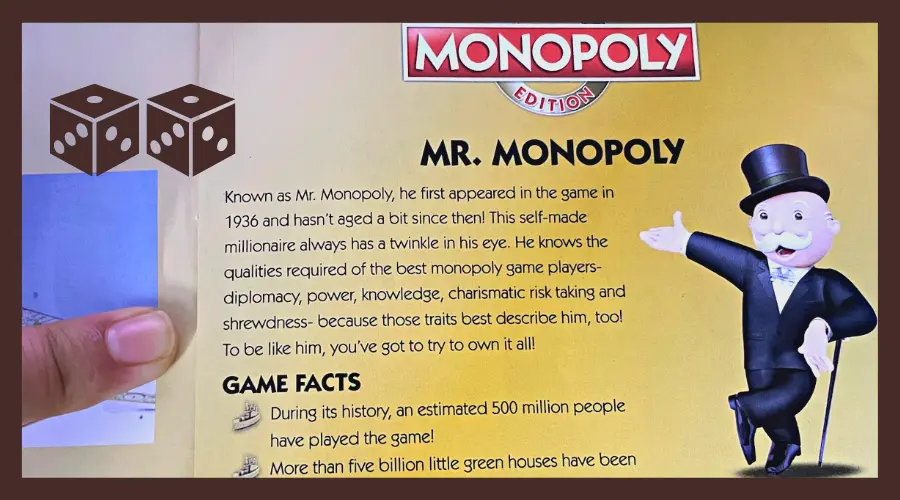
Who is the monopoly man?
The character of the monopoly man or the Monopoly guy is actually based on the depictions of Rich Uncle Pennybags(actual name Milburn Pennybags), who happens to be the mascot for the popular board game monopoly hence evidently the name. Initially called only “uncle rich”.
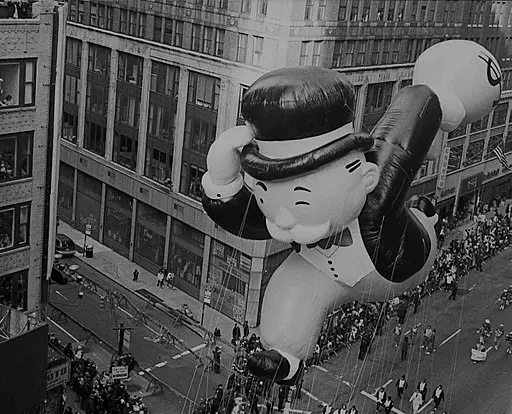
The first public depictions of the man of Monopoly can be found in the Parker Brothers board & card games including the very famous chance & chest board games.
This obviously is before he was featured in the famous board game Monopoly and henceforth became immortalized as the famous Monopoly’s man.
Interestingly it is believed that the original concept & inspiration of the visuals for monopoly man was taken from the equally famous then-era progressive businessman JP Morgan.
However, some also believe that the fictional character Daddy Warbucks from the famous Story “Annie” could also be an inspiration for the monopoly game’s man.
There is also another popular theory that claims that the actual inspiration for Monopoly Man was based on the German businessman Otto Kahn.
Well, this is certainly well established based on the fact that both of them share the same style of dressing, ranging from the top hat & black coat to the white handlebar mustaches.
Who is the monopoly man based on?
American industrialist J. P. Morgan is supposedly the inspiration for the Monopoly character known as Milburn Pennybags or popularly known as “Rich Uncle Pennybags” in the American version of the game.
What is the name of the Monopoly Man?
Milburn Pennybags or the Rich Uncle Pennybags is the official name of the Monopoly Man.
This distinguished gentleman wears a top hat known as Mr. Monopoly or the Monopoly Man.
In 1936, the Monopoly Man debuted on the game’s Chance and Community Chest cards without a proper moniker until his appearance in the 1946 game Rich Uncle.
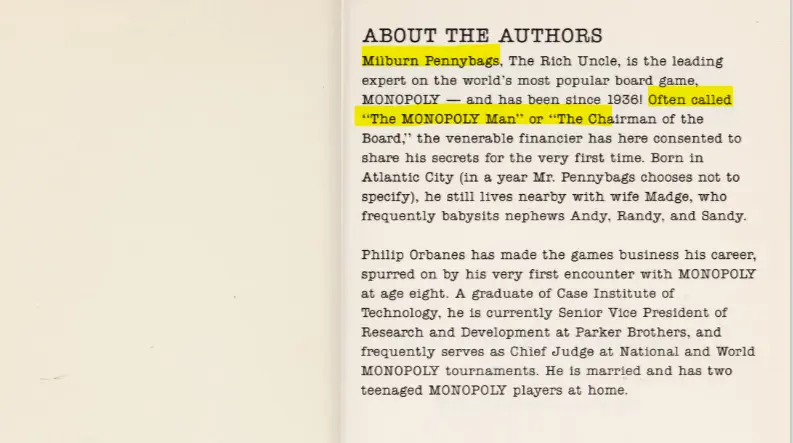
The full name of Uncle Pennybags was revealed to be Milburn Pennybags in a book titled The Monopoly Companion, published in 1988.
I was able to find this book from the archive(only few pages though). (Reference)
What does the Monopoly Man do?
The Monopoly Man is the mascot of the popular board game, Monopoly. While his backstory has never been officially confirmed, it is widely believed that he made his fortune through real estate investments, just like the players of the game.
Real estate has always been a popular way for people to accumulate wealth, and it makes sense that the Monopoly Man would have followed this path as well.
Forbes magazine has even created a fictional profile of the Monopoly Man, claiming that he attended the prestigious University of Pennsylvania and made his fortune in the gambling mecca of Atlantic City.
While this profile is not based on any real information, it does highlight the fact that the Monopoly Man is a symbol of wealth and success.
It’s interesting to note that the Monopoly Man has become more than just a mascot for a board game. He has been used in various forms of media, including movies, TV shows, and even political protests.
His image has been co-opted by various groups to represent everything from corporate greed to social justice. Regardless of how he is used, the Monopoly Man remains a recognizable symbol of wealth and power.
How rich is the monopoly man?
The Monopoly Man, also known as Uncle Pennybags or Mr. Monopoly, was valued at an estimated $1.2 billion.
Despite his fictional wealth, Uncle Pennybags has been portrayed as having trouble managing his money.
In fact, the premise of the Monopoly game is all about managing money and assets, and the players are tasked with building their own wealth by buying and selling properties.
While Uncle Pennybags may be independently wealthy, the game suggests that even the richest among us need to be careful with their money.
[Source]
What does the monopoly man wear?
Monopoly Man is depicted as a portly elderly man with a mustache, dressed in a morning suit with a bowtie and a top hat.
This iconic outfit has become synonymous with the character, and it is instantly recognizable to people all around the world.
Monopoly Man’s distinctive appearance has made him a beloved figure in popular culture.
He has been featured in countless parodies, memes, and other forms of media, cementing his place as one of the most recognizable mascots of all time.
Did the Monopoly man have a Monocle?
No, the Monopoly Man never had a Monocle.
The Monopoly Man, often known as Rich Uncle Pennybags, is never seen wearing eyewear.
There is no canonical image of him sporting a monocle.
Our minds have come to associate the top hat, mustache, and monocle as defining characteristics of a particular character.
The Mandela Effect may be seen at work here in which several individuals have the same mistaken recollection.
Did the Monopoly Man ever have glasses?
No, the Monopoly man never had glasses.
Despite popular belief, Monopoly Man never had the iconic monocle or eyeglasses (an archaic kind of eyewear).
What does the Monopoly Man wear on his face?
Monopoly Man does not wear anything on his face including monocle. He is depicted with thick mustache on his face.
The Monopoly game’s mascot is a wealthy uncle named Uncle Pennybags.
He’s seen here as a jowly elderly guy with a mustache, dressed in a morning suit and top hat.
Why do we remember the monopoly man has a monocle?
Maybe you’re wondering why Monopoly Man wears a monocle. The phenomenon responsible for Monopoly Man Monocle confusion is known as “the Mandela effect.”
The Impact of Mandela Effect
Some of our youth’s most cherished recollections may be fabrications, as described by the phrase “The Mandela Effect.”
Everything you believe to be true is an illusion created by your brain.
The Mandela Effect is a term used to explain the widespread erroneous memories among a big group of individuals.
The Mandela Effect may make it such that our minds can’t create reliable memories.
Because of the Mandela Effect, the Monopoly Man’s monocle is often misunderstood as a pair of eyeglasses.
Unfortunately, popular recollection is wrong.
The iconic banker in the 1936 board game has always had a handlebar mustache and never once had his eyes covered.
Somehow, in our minds, Mr. Monopoly got mixed up with another fashionable figure from the era, Mr. Peanut.
Mr. Peanut resembled Mr. Pennybags in appearance.
Therefore, it is generally accepted that Mr. Peanut are responsible for this erroneous recall.
Since Mr. Peanut sported a monocle, our mind arbitrarily assigned one to Monopoly Man.
These confused figures have come to symbolize the stereotypical affluence and status that comes with their sharp attire and monocle.
Who has more money, Scrooge McDuck or the Monopoly man?
To put it simply, Scrooge McDuck has more money than Monopoly Man.
According to Forbes’ fictitious top 15, Scrooge McDuck is the duck we should all want to emulate because of his immense riches.
He has always had much more money than Monopoly Man.
With a net worth of $7.1 billion in 2006, Monopoly Man reached as high as a sixth place on Forbes’ list of the 15 fictional wealthiest people in the world.
But Scrooge McDuck was consistently a fan favorite, ranking top in 2007, 2011, and 2013.
Versions of Monopoly Game where you see Monopoly Man
Aside from appearing on the Chance and Community Chest Cards, Monopoly Man also appears on the actual game board.
Roll him on the Speed Die. You may take your usual turn and then go to the closest unowned property to purchase, auction, or rent.
You can take your normal turn and travel to the nearest rented property if all properties are owned.
